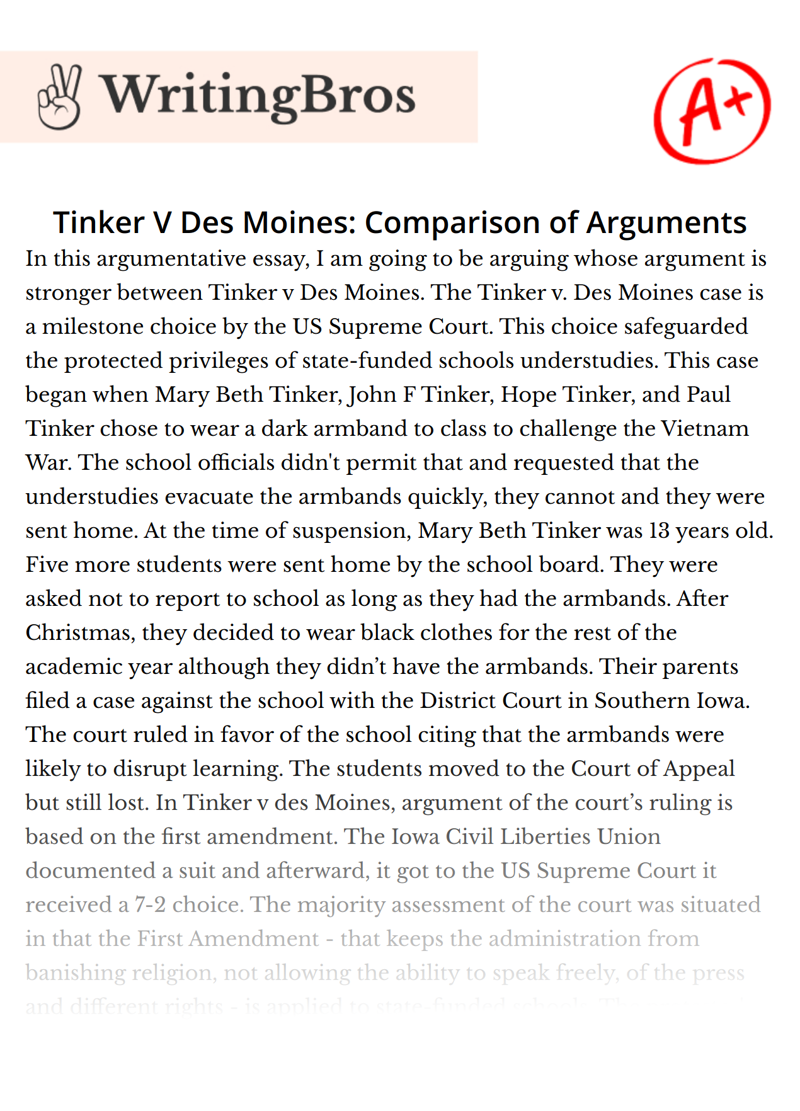Tinker V Des Moines: Comparison of Arguments

In this argumentative essay, I am going to be arguing whose argument is stronger between Tinker v Des Moines. The Tinker v. Des Moines case is a milestone choice by the US Supreme Court. This choice safeguarded the protected privileges of state-funded schools understudies. This case began when Mary Beth Tinker, John F Tinker, Hope Tinker, and Paul Tinker chose to wear a dark armband to class to challenge the Vietnam War. The school officials didn't permit that and requested that the understudies evacuate the armbands quickly, they cannot and they were sent home.
At the time of suspension, Mary Beth Tinker was 13 years old. Five more students were sent home by the school board. They were asked not to report to school as long as they had the armbands. After Christmas, they decided to wear black clothes for the rest of the academic year although they didn’t have the armbands. Their parents filed a case against the school with the District Court in Southern Iowa. The court ruled in favor of the school citing that the armbands were likely to disrupt learning. The students moved to the Court of Appeal but still lost. In Tinker v des Moines, argument of the court’s ruling is based on the first amendment.
The Iowa Civil Liberties Union documented a suit and afterward, it got to the US Supreme Court it received a 7-2 choice. The majority assessment of the court was situated in that the First Amendment - that keeps the administration from banishing religion, not allowing the ability to speak freely, of the press and different rights - is applied to state-funded schools. The protester's supposition based that troublesome emblematic discourse was not ensured by the main correction and that: 'I have never accepted that any individual has an option to give addresses or take part in exhibitions where he satisfies and when he satisfies.' the judge said that this decision would give approval for understudies and understudies to oppose requests of school principals.
The more grounded contention is the greater part contention. The principal correction is certain that each and every American citizen has the privilege to the right to speak freely of discourse, likewise, the main revision doesn't state which place the ability to speak freely isn't permitted. The understudies, for this situation, didn't damage or express anything to anybody, they just needed to wear an armband that symbolized their assessment. It isn't right that school authorities that don't concur with that assessment simply blue pencil it making new decide hence. The way that the understudies didn't successfully hurt some other understudy and didn't influence the activity of the school was another indication of the wrongdoing of the demonstration of the schools head, this is additionally the assessment of the court: 'physically and considerably meddle with the prerequisites of fitting control in the activity of the school.
Cite this Essay
To export a reference to this article please select a referencing style below

